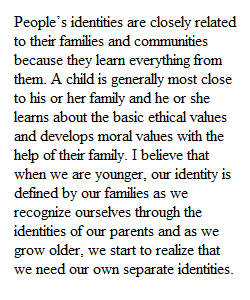


Q Discussion #5 Family and Community Kinship is a longstanding topic of anthropological inquiry. In this module, you studied and contemplated families and communities in the United States through a variety of anthropological lenses. Many of the examples you read and watched alluded to how parenting and families are changing in the 21st century. You learned that single women and couples are now taking more time before starting families. You saw examples of same-sex parenting, adopted families, later-in-life parenting, non-"blood"-relative relations, and many, many other family arrangements common in US culture and society.. In the US, "non-traditional" families are common, but that doesn't mean that family is any less important. Think about the types of families considered in this module and visit with your peers over the following topic: Prompt: How does the acceptance or rejection of various types of families into American culture reflect broader (social or political or economic or religious - even generational) changes happening in American society? Did learning about many types of families change your definition of what family means? Why or why not? While it's totally acceptable to talk about your own experiences or share examples from popular culture in this discussion post, for full credit, make sure to utilize anthropological terms and concepts and incorporate examples from the Module to support your posts and peer responses. (200 - 250 words) Guidelines for Discussion Boards You will submit an original, substantial response to the Module's Discussion Board prompt. You will then post a genuine, substantial response to two (2) of the peers in your group. Grading Rubric Discussion Boards are worth 20points each, and will be graded using the letter grade scale. For each discussion, you will be expected to post one or two short (200-250 words - about the length of the grading rubric) but substantial paragraphs, and respond to (at least) two (2) of your classmates’ posts with a substantial response (100-150 words). If you ONLY submit your post, then your maximum discussion grade will be 60% (D). If you respond to one other person's post, then your maximum discussion grade will be 70% (C). If you follow instructions and respond to two of your classmates' posts, your discussion grade will be raised from anywhere between 80% (B) to 100% (A). By substantial we mean that you say more than just “I agree” or “great point”. You must explain yourself by referring back to the corresponding topic. NOTE ABOUT DISCUSSIONS: Discussions are NOT political/religious platforms. They are designed to demonstrate that you understand and can clearly and effectively articulate anthropological concepts and facts as they pertain to issues in American Culture and Society. You may certainly incorporate outside reading material or anecdotal information provided it is relevant to the Topic. Only relay personal beliefs or opinions if prompted by assignment instructions.
View Related Questions